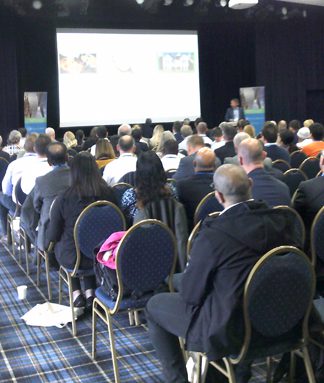The 2022 Midlands Fraud Forum conference in Birmingham had another bumper audience yesterday, writes Mark Rowe.
It was also a varied one, with people from the NHS, councils, trading standards, law and accountancy firms (the Forum’s chair, Andrew Herring, is a partner at Pinsent Masons in Birmingham), banks and building societies, and police detectives from several forces. That reflects how Birmingham – like other regional centres, Leeds, Bristol and Newcastle – has a large enough constituency to support such a Forum; not only London (and the London Fraud Forum’s chair, Rob Brooker, was among those attending; the LFF’s annual conference is on October 20, at the Guildhall).
The Midlands Forum like the London one and any number of groups kept going during the covid pandemic when it could not meet in person by running webinars. Andrew Herring thanked visitors for their engagement. “Regrettably, the scale of fraud in the UK only appears to be increasing, and the counter-fraud community’s efforts have never been more needed. One only needs to hear the news about the reported massive scale of fraud on the UK Government’s covid loan schemes to appreciate the scale of the challenge.”
Indeed, it’s always a good gauge of how relevant an event is, to look in that day’s Metro newspaper and see if any news is about the subject. So it was yesterday with fraud; for the trade body UK Finance released its annual fraud report.
Numerous speakers set out the sheer volume of fraud; and how the fraudsters are innovative and active, whether it’s investment fraud (offering ‘too good to be true’ schemes that attract people’s pension money), romance fraud, or fraud by employees – who, Professional Security heard, may be coming up with new motivations to defraud their employer, if they feel the pinch of price rises in fuel and energy; and if they don’t like having to go back to pre-covid commuting, meaning traffic and commuting and finding childcare.
One afternoon speaker was a barrister, Ari Alibhai of QEB Hollis Whiteman, who talked the Forum through private prosecutions where criminals are illegally accessing and selling creative content – whether music, televised Premier League football, Netflix drama, or any streamed or pay-tv. Ari has undertaken almost 100 private prosecutions over 15 years, with a focus on broadcast piracy and fraud; and for such clients as the Premier League, broadcaster SKY, the anti-counterfeiting trade body FACT, and Virgin Media.
Ari described the timeline of a private prosecution, and gave examples. In one case that ended in November 2021 with a man pleading guilty and getting a 30-month jail term, FACT worked with BT to identify a man who created and built a software package which enabled illegal access to BT Sport, SKY, Netflix and other subscription television content. FACT referred the case to the North West Regional Organised Crime Unit, who, with Greater Manchester Police supported a private prosecution, which was brought by FACT.
The event opened with a talk by the West Midlands police and crime commissioner Simon Foster, who before being elected PCC last year was a legal aid solicitor. Besides his ‘call to arms’ including some party-political swipes at the Government for not doing enough to counter fraud and to take the crime seriously enough, it was noticeable that he (unlike some political speakers at such events) stayed after speaking and took interest in some of the exhibitors.
A remote speaker was the veteran criminologist and academic authority on fraud, Prof Michael Levi of Cardiff University, who (with funding from the PCC and MFF) has researched a ‘public health’ approach to tackling fraud.
The day amounted to giving those in the field a thorough update on developments, such as the regional cyber resilience centres – offering typically small businesses cyber help such as advice on patching and securing back-ups – serviced by a National Cyber Resilience Centre Group, a not for profit company headed by the senior detective Nick Bell, a morning speaker.
A return speaker (from 2015) was Det Chief Supt Matthew Bradford, head of national lead force for City of London Police – the City force being the national lead on economic crime. The day was not without humour, such as from Mark Wilson, partner at RSM, who (pictured speaking) recalled his 1980s beginnings in insolvency work in London; and some investment frauds, such as trees in Costa Rica; and saplings impregnated with truffles. Such offerings may sound ‘too good to be true’; yet professional people are among those being swindled by investing some or all of their pension savings in such schemes. Mike Levi touched on what to do to offenders, and for victims. Given all the vulnerability – from various sorts of scams – where to prioritise?
More in the August print edition of Professional Security magazine.










